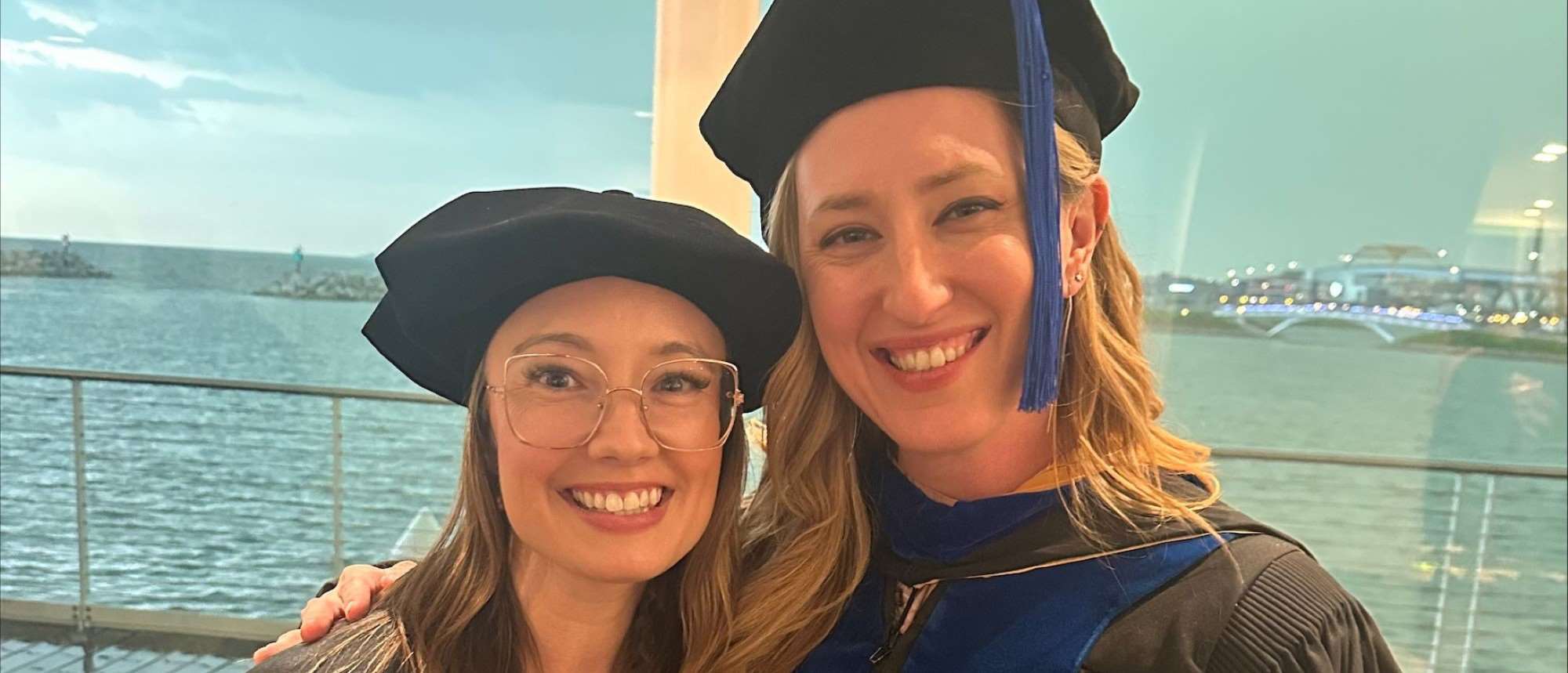Small Town Researcher Makes a Big Impact in Public Health

l-r: Annika Swenson, DrPH ’25, MPH ’11; Jessica Olson, PhD ‘15, MPH ’17
For Annika Swenson, a DrPH student who graduated this May from the Medical College of Wisconsin (MCW), rural life is more than a lifestyle – it’s shaped her identity and purpose.
“I don't want to ever leave rural life because I feel such a sense of community,” says Swenson, who lives in Mineral Point, Wisconsin. “I live in a town of 2,000 people and grew up in a town of 2,000 people.”
Growing up in northern Wisconsin, Swenson witnessed how rural communities often faced healthcare challenges – from long travel times to delayed or inaccessible care – with quiet resilience. These disparities hit home when her grandmother, who lived on a potato farm in Grand Rapids, Minnesota, was diagnosed with stage 4 cancer. With limited resources, she never received full treatment. Against the odds, she lived another eight years.
“Most people aren’t that lucky,” Swenson says. That reality fuels her passion for understanding what cancer care looks like for rural patients like her grandmother.
Addressing Health Issues in Rural Areas
Swenson’s dissertation focused on the experiences of cancer patients in Iowa County, Wisconsin, where residents face disproportionately high cancer rates and mortality.
“Many patients in my area will opt for a double mastectomy versus driving to Madison for weekly radiation therapy,” she says. “That's a big difference in your quality of life and it's sad to think that decision has to be made.”
Her work highlights how geography intersects with care, not just in terms of logistics, but in how people experience illness. In interviews for her study, participants described how friends, neighbors, and church groups supported them by providing transportation, helping with chores, or quietly delivering meals to their porch.
“These informal networks often go unrecognized in healthcare,” says Swenson. “But they are critical to how care is actually delivered in rural communities.”
She recalls one particularly emotional interview with a participant who had lost his spouse to cancer while navigating his own diagnosis. “That wasn’t supposed to happen,” he told her, overcome with emotion. In that moment, Swenson didn’t try to fill the silence. Instead, she held space for his grief – a reflection of her belief that research must honor the depth of human experience.
From Personal Story to Broader Solutions
Swenson’s interest in public health began in that very spirit – through stories and lived experiences. As a Master’s in Public Health (MPH) student at MCW nearly two decades ago, she was deeply affected by a patient who had relocated from a small town to Wauwatosa, leaving behind family and even a beloved dog, just to access treatment.
“That move severed more than geography, it severed emotional lifelines,” Swenson says.
The insights she gained from these personal stories and academic research guide her work in the larger healthcare landscape. In 2007, Swenson joined Novartis Oncology, where she now serves as the National Director of Field Medical. In this role, she leads a team of nearly 40 professionals who collaborate with cancer care centers across the country to improve clinical trials and expand access to therapies. Through this work, she helps shape patient care on a national level.
“You touch the lives of so many patients through clinical trial work,” she says.
Her career also brought her unexpected attention when she gave a TED Talk about surviving a lightning strike while 20 weeks pregnant with her first daughter. The story became a metaphor for the fragility and resilience of life, qualities she sees mirrored in her rural patients.
“It really emphasized to me just the gift of time and how precious life is,” says Swenson, whose daughter is now 10 years old.
A Full-Circle Commitment to Rural Health
Despite her success, something kept drawing Swenson back to MCW. During the COVID-19 pandemic, a loved one was diagnosed with cancer, reigniting her sense of urgency about rural healthcare disparities.
“How many people don't know what to do when you get a call from a clinician saying you have cancer?” she says. “My heart couldn't handle it. I had to do something.”
She returned to MCW for her Doctor of Public Health, working with Jessica Olson, PhD ‘15, MPH ‘17, associate professor in the Division of Community Health, and supported by her dissertation committee, including David Nelson, PhD, professor of family and community medicine, and Chris Simenz, PhD, MS, associate professor and associate director of the Master's and Doctor of Public Health programs. Her research uses phenomenology, a method that focuses on people’s lived experiences, to capture voices that are often unheard.
“Through my dissertation, I hope to elevate the stories of these patients and their voice,” she says.
Swenson’s calls her recent graduation, which falls twenty years after she began her career at MCW, a full-circle moment.
“I think about the difference that we can make in every community, not just in the big ones,” she says. “It’s time we shift our perspective from asking, ‘What’s the matter with you?’ to genuinely understanding, ‘What matters to you?’”



